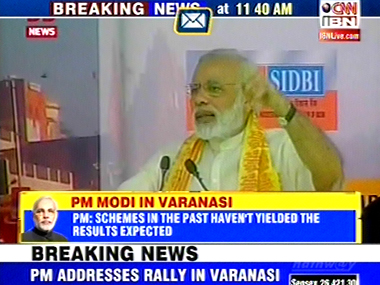As Prime Minister Narendra Modi’s cavalcade drove into a small venue where he gave away e-rickshaws and pedal rickshaws to beneficiaries, he was greeted with a traditional welcome of “Har har Mahadev”. However, by the time he left, an unmistakable sense of skepticism hung in the air — managing expectations in his constituency is going to take some doing. A select audience of around 2,000 hardly displayed the sort of frenzy that typified audiences in the years gone by. But this was probably not entirely unexpected, as this wasn’t a rally. Rather it was a government function attended by state cabinet minister Balram Yadav and Governor of Uttar Pradesh Ram Naik. [caption id=“attachment_2438778” align=“alignleft” width=“380”] Prime Minister Narendra Modi in Varanasi. IBNLive[/caption] But while taking potshots at the Congress, there was no trace of any hesitancy. “Those who bothered least to open accounts for the poor are now asking me if these accounts are operational,” he said in an oblique reference to the critique of the Jan Dhan Yojna by his opponents. Ready with statistics, the prime minister said that nearly 18 crore accounts had been opened as part of the scheme, and Rs 30,000 crores had been deposited by account holders. “Despite the nationalisation of banks, they have been inaccessible to the poor,” he noted while addressing an audience that largely comprised rickshaw-pullers and their families. In Modi’s view, Friday’s function carried aspirational symbolism, focusing as he did on how to take people out of poverty. In his brief interaction with rickshaw-pullers, he said that skill development for low-paid jobs would enhance income. “These rickshaws are just meant to pull you out of poverty,” he said, adding that he would request all beneficiaries to educate their children. “The most potent weapon against poverty is education,” he said drawing a huge round of applause from the audience. For the past nine months, Modi has made plans to visit his constituency on three occasions, but could not do it due to last minute changes. The city, steeped in religiosity that often borders on superstition, was rife with speculation that there was a divine desire to keep Modi from Varanasi. The prime minister succeeded in breaking that jinx. However, managing the expectations of the people is and will continue to be the real challenge. Modi’s victory engendered an optimisim among the electorate that there would be substantial change in the city. A visit to Varanasi demonstrates instead that the chaos and problems of the city have persisted, if not multiplied. As a result, a sense of disillusionment (and not hostility so far) has sunken in. This is precisely why Modi, towards the end of his address, declared that he would do so much for the city, that it would surpass the work of “50 years”. People cheered him, but skepticism was palpable in the audience. That should be the cause of worry for Modi.
Prime Minister Narendra Modi’s first visit to his constituency of Varanasi highlighted that managing the expectations of the people is and will continue to be the real challenge
Advertisement
End of Article


)
)
)
)
)
)
)
)
)



